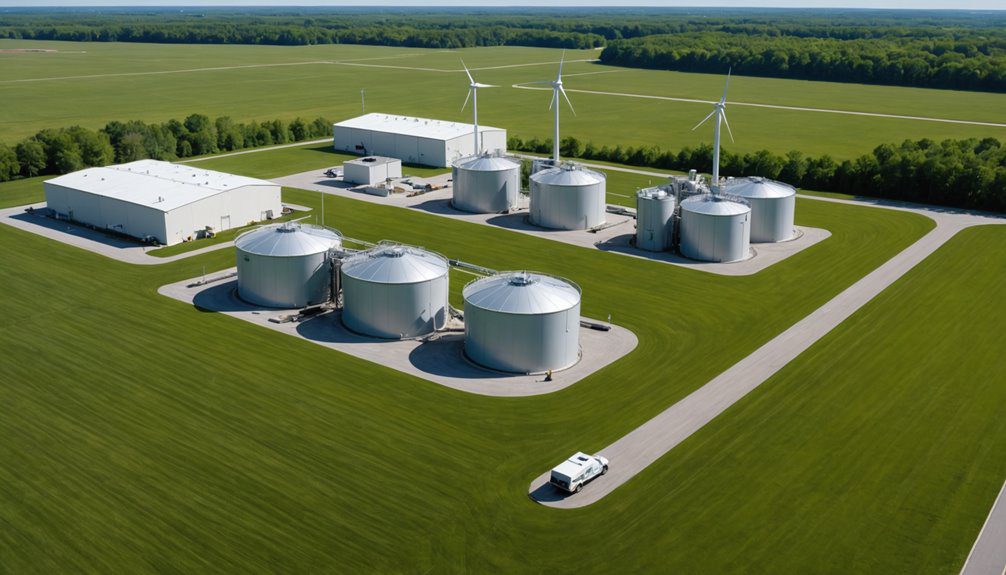You might find it interesting to explore how the Tennessee Petroleum Products and Alternative Fuels Bond plays a pivotal role in balancing regulatory compliance with the push for sustainable energy. This bond not only provides a financial cushion for environmental mishaps but also incentivizes the adoption of alternative fuels across the state. As Tennessee navigates its energy landscape, understanding the implications of this bond could reveal significant economic and environmental impacts. What challenges and opportunities lie ahead in this evolving framework?
Overview of the Bond

When it comes to understanding the bond related to Tennessee petroleum products and alternative fuels, you'll find it essential to grasp its purpose and implications. This bond primarily aims to ensure compliance with regulations governing the handling and distribution of petroleum products.
You can think of it as a safety net, protecting both consumers and the environment from potential liabilities that might arise due to spills or accidents. The bond serves as financial assurance that businesses involved in petroleum operations will conduct their activities responsibly.
Should any unforeseen mishaps occur, the funds from the bond can be utilized for cleanup efforts and compensating affected parties. This aspect emphasizes the importance of maintaining high standards in the industry.
In Tennessee, the bond's specifics, including the required amounts and conditions, can vary based on the type of product and the scale of operations. It's crucial for businesses to stay informed about these requirements to avoid penalties and ensure smooth operations.
Importance of Alternative Fuels
Exploring alternative fuels is crucial for reducing our dependence on traditional fossil fuels and addressing environmental concerns. As you consider the impact of your energy choices, remember that alternative fuels, like biofuels, hydrogen, and electricity, offer sustainable options that can significantly lower greenhouse gas emissions.
By embracing these fuels, you're not just making a personal choice; you're contributing to a larger movement towards cleaner air and a healthier planet.
Additionally, using alternative fuels can enhance energy security. When you diversify your energy sources, you reduce vulnerability to oil price fluctuations and supply disruptions. This means you'll have more stable energy costs and a more reliable supply for your needs.
Moreover, alternative fuels can stimulate innovation and job creation within the energy sector. By investing in these technologies, you encourage research and development, leading to new solutions that can transform the energy landscape.
Economic Impact on Tennessee

Harnessing alternative fuels can significantly bolster Tennessee's economy by creating jobs and attracting investments. As you explore this sector, you'll see that the shift toward renewable energy opens up numerous opportunities for local businesses and entrepreneurs.
From manufacturing to distribution, each segment of the alternative fuels industry can generate employment, providing residents with stable jobs that support families and communities.
Moreover, investing in alternative fuels helps Tennessee become less reliant on traditional fossil fuels, which can lead to more stable energy prices. This stability is crucial for businesses looking to expand or relocate.
By fostering a diverse energy portfolio, you're also encouraging innovation within the state, which attracts more research and development investments.
As you consider the broader economic implications, keep in mind that these investments often lead to improved infrastructure, better transportation systems, and enhanced energy efficiency.
The ripple effect can stimulate economic growth across multiple sectors, including agriculture, manufacturing, and technology.
You'll find that embracing alternative fuels not only positions Tennessee as a leader in sustainable energy but also paves the way for a more resilient and prosperous economy for everyone involved.
Key Projects Funded
Tennessee has seen a surge in key projects funded to advance its alternative fuels sector, showcasing the state's commitment to sustainable energy.
You might be interested to know that several initiatives have emerged, focusing on biofuels, electric vehicle infrastructure, and innovative energy solutions.
One notable project involves the development of biodiesel production facilities, aimed at converting local agricultural waste into renewable energy sources. This not only boosts local economies but also reduces reliance on traditional fossil fuels.
You'll also find that investments in electric vehicle charging stations are on the rise, making it easier for Tennesseans to adopt cleaner transportation options.
Additionally, the state has funded research grants for universities and tech companies, encouraging advancements in alternative fuel technologies.
These collaborations foster innovation and help Tennessee stay at the forefront of the energy transition.
Environmental Benefits

The environmental benefits of investing in alternative fuels are significant and multifaceted. By shifting away from traditional petroleum products, you're helping reduce greenhouse gas emissions. This transition lowers the carbon footprint of transportation and energy sectors, promoting cleaner air and healthier communities.
Alternative fuels like biofuels, electricity, and hydrogen produce fewer harmful pollutants, leading to improved air quality. You'll notice that cities adopting these fuels often report reduced smog and respiratory issues among residents.
Furthermore, alternative fuels can be sourced from renewable resources, which means less reliance on finite fossil fuels. This shift not only conserves natural resources but also enhances energy security.
Additionally, you're supporting local economies when you invest in alternative fuels. Many of these energy sources can be produced domestically, reducing the need for imports and stimulating job creation in emerging industries.
Future Outlook and Challenges
As we look ahead, the future of alternative fuels in Tennessee presents both promising opportunities and notable challenges. You'll find that advancements in technology and growing public interest in sustainability can drive the adoption of alternative fuels.
However, you also face hurdles, such as infrastructure limitations and the need for substantial investment.
One of the most significant challenges is developing a robust infrastructure to support alternative fuels. You'll need refueling stations and distribution networks that can handle biofuels, electric vehicles, and hydrogen. Without these facilities, widespread adoption will stall.
Regulatory frameworks also play a key role. You may encounter shifting policies that can either promote or hinder the growth of alternative fuels. Staying informed and engaged with legislative changes is crucial for you to navigate this evolving landscape.
Moreover, competition from established fossil fuel industries remains a concern. They often have the resources and market dominance that can overshadow alternative options.
To overcome these challenges, you'll need to advocate for more incentives and support for alternative fuel initiatives.
Conclusion
In conclusion, the Tennessee Petroleum Products and Alternative Fuels Bond plays a vital role in shaping a sustainable energy future for the state. By funding innovative projects and promoting alternative fuels, it not only boosts economic growth but also helps protect the environment. As you consider the importance of this bond, remember its potential to drive positive change and ensure safety in handling petroleum products. The future looks bright, but challenges remain that we must tackle together.


